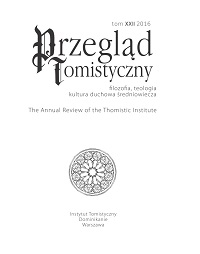KRZYSZTOF BRACHA, Nourishment and Correction: Preaching and Reform in Central-Eastern Europe in the Later Middle Ages

Volume XXII: 2016
Philosophy — Theology— Spiritual Culture of the Middle Ages
ISSN 0860-0015
e-ISSN 2544-1000
SUMMARY
This article shows that the connection between Church reform and preaching during the later Middle Ages attained particular features in Central Europe. These features reached beyond the geographical boundaries of the region, especially in the case of Hussite thought and its concept of free expression of ideas. This was due primarily to the rising role of preaching within the pastoral activity of the Church in general, as well as to the considerable development of homiletics by the mendicant orders and the newly established academic communities of Central Europe. The Church reform movement in Central Europe in the later Middle Ages has been thoroughly researched. Yet the role of the instrumentum praedicationis within it has not received sufficient attention. The limitations imposed by the form of an article do not allow one to cover all the details of such a wide and diverse phenomenon. We will therefore restrain ourselves to a comprehensive characterization, accompanied by some detailed analysis of the chief motifs and ideas and the most representative authors, protagonists, and propagators of the use of the pulpit in the cause of Church reform and the reform of piety more generally. This will be done mainly on the basis of statements by Czech pre-Hussite and Hussite authors, including John Hus himself, as well as by Polish, Silesian, and German preachers (Johlín of Vodňany, John Milíč of Kroměříž, John Štěkna, Conrad of Waldhausen, Matthew of Janow, Matthew of Cracow, Petrus of Miłosław, John of Ząbkowice, Nicholas Magni of Jawor, Stanislas of Skarbimierz, John Geiler of Keisersberg, John of Wünschelburg, John of Capistrano). The wide range of primary sources, including texts other than specifically homiletic materials, demonstrates a particular Central-European phenomenon: the post-Lateran elevation of preaching as an instrument of reform, based on the Biblical concept of preaching as a triad of word-seed-nourishment (Lc 8:11), and its material result: the erection of permanent preaching posts.
According to the idea of the time, a sermon is a form of nourishment indispensable for salvation. It was also the sole instrument of mass communication (and a particularly effective one when the vernacular language spoken by the faithful was used). Preaching was perceived as an instrument of effective evangelization and instruction and a means of deepening piety by criticising theological errors and exhorting believers to go to the confessional abd receive Holy Communion frequently. The sermon thus finds itself within a broader trend toward practical and pastoral implementations of theology (theologia practica). It was not by chance that this reforming idea was based on the authority of the Bible. Indeed, all non-Biblical adinventiones of earlier times were considered by the reformers of this era to be causes of the crisis. Through a return to the authentic sources of faith — to the Bible and the imitation of Christ — reforming preachers wished to heal the Church. They pushed piety in the direction of devotio moderna.
